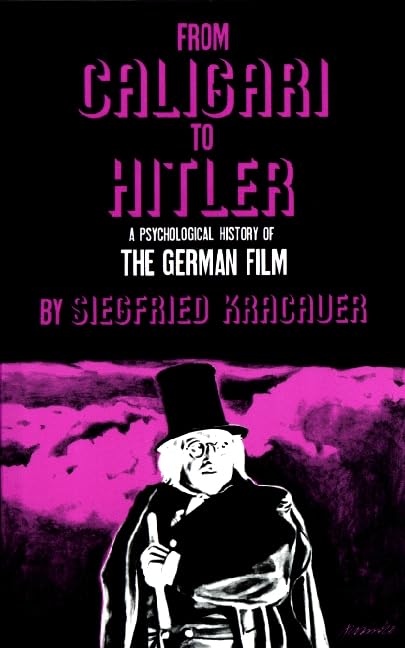Princeton University Press
From Caligari to Hitler: A Psychological History of the German Film (Revised)
Couldn't load pickup availability
Title: From Caligari to Hitler: A Psychological History of the German Film (Revised)
Author: Siegfried Kracauer
I: 1710396
ISBN: 9780691025056
Publisher: Princeton University Press
Published: 1966
Binding: Paperback
Language: English
Edition: 5th
Number of Pages: 395
Section: Performing Arts | Film | History & Criticism
Condition Note: Reading copy with considerable wear. May have marking in text. Binding may be cracked; all pages present. Does not include dust jacket. We sometimes source from libraries. We ship in recyclable American-made mailers. 100% money-back guarantee on all order
Publisher Description:
A landmark, now classic, study of the rich cinematic history of the Weimar Republic, From Caligari to Hitler was first published by Princeton University Press in 1947. Siegfried Kracauer--a prominent German film critic and member of Walter Benjamin's and Theodor Adorno's intellectual circle--broke new ground in exploring the connections between film aesthetics, the prevailing psychological state of Germans in the Weimar era, and the evolving social and political reality of the time. Kracauer's pioneering book, which examines German history from 1921 to 1933 in light of such movies as The Cabinet of Dr. Caligari, M, Metropolis, and The Blue Angel, has never gone out of print. Now, over half a century after its first appearance, this beautifully designed and entirely new edition reintroduces Kracauer for the twenty-first century. Film scholar Leonardo Quaresima places Kracauer in context in a critical introduction, and updates the book further with a new bibliography, index, and list of inaccuracies that crept into the first edition. This volume is a must-have for the film historian, film theorist, or cinema enthusiast.
In From Caligari to Hitler, Siegfried Kracauer made a startling (and still controversial) claim: films as a popular art provide insight into the unconscious motivations and fantasies of a nation. In films of the 1920s, he traced recurring visual and narrative tropes that expressed, he argued, a fear of chaos and a desire for order, even at the price of authoritarian rule. The book has become an undisputed classic of film historiography, laying the foundations for the serious study of film. Kracauer was an important film critic in Weimar Germany. A Jew, he escaped the rise of Nazism, fleeing to Paris in 1933. Later, in anguish after Benjamin's suicide, he made his way to New York, where he remained until his death in 1966. He wrote From Caligari to Hitler while working as a "special assistant" to the curator of the Museum of Modern Art's film division. He was also on the editorial board of Bollingen Series. Despite many critiques of its attempt to link movies to historical outcomes, From Caligari to Hitler remains Kracauer's best-known and most influential book, and a seminal work in the study of film. Princeton published a revised edition of his Theory of Film: The Redemption of Physical Reality in 1997.
